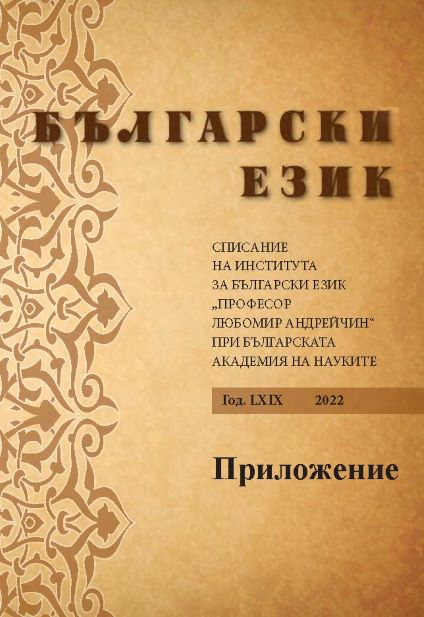Българските дезидеративни глаголи и техните украински съответствия в паралелен корпус
Bulgarian Desiderative Verbs and Their Ukrainian Counterparts in a Parallel Corpus
Author(s): Ivan Derzhanski, Olena SirukSubject(s): Language studies, Language and Literature Studies, Theoretical Linguistics, Applied Linguistics, Philology
Published by: Институт за български език „Проф. Любомир Андрейчин“, Българска академия на науките
Keywords: Bulgarian language; desideratives; dispositional constructions; reflexivedative constructions; Ukrainian language
Summary/Abstract: All uses of Bulgarian desiderative verbs of the type «glagoli» ‹ми› се ‘feel like ‹verb›ing’ (e. g., спи ми се ‘be sleepy’, работи ми се ‘feel like working, be in a mood for work’) and their prefixed phase derivatives were excerpted from a parallel corpus of Bulgarian and Ukrainian fictional texts. In the corresponding Ukrainian sentences, the specific semantics of the construction is most often expressed either by an independent lexical item – the verb хотітися ‘want, feel like’ or хотіти ‘want’ – or by a combination of a reflexive verb and an optional dative experiencer, as in (мені) працюється ‘I want to work, feel like working; I work eagerly; my work is going well’. The latter counterpart is of particular interest due to its structural similarity to the Bulgarian desiderative verbs. The comparison shows that the constructions in the two closely related languages are considerably different in meaning (which is the reason why this correspondence is only the third most frequent) and that although they have a lot in common (as attested by their lexical diversity), translators tend to overestimate the degree of similarity between them.
Journal: Български език
- Issue Year: 69/2022
- Issue No: Special
- Page Range: 96-112
- Page Count: 17
- Language: Bulgarian

